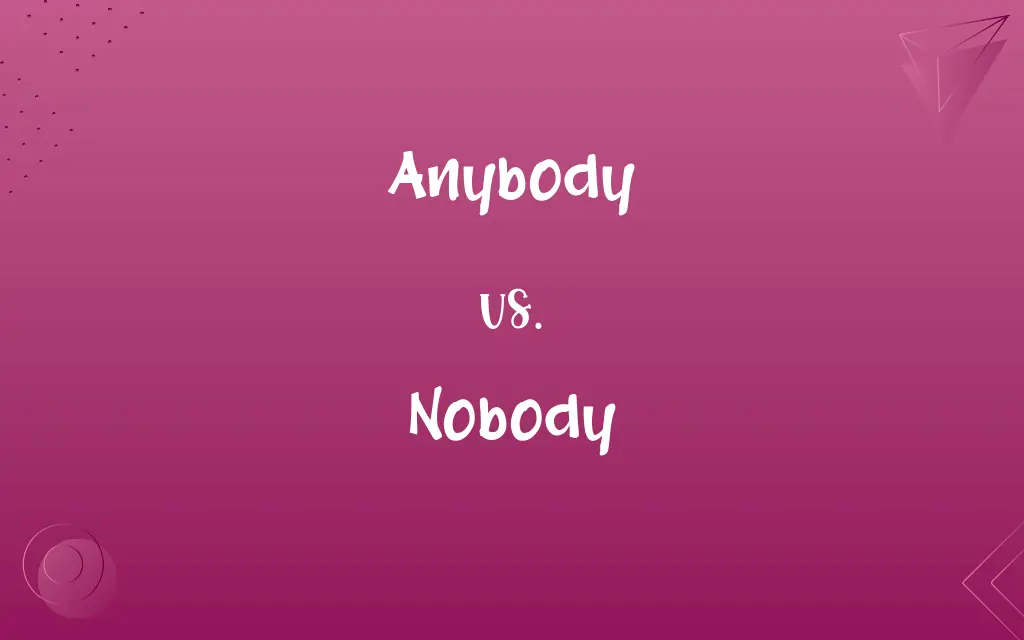Anybody vs. Nobody: Know the Difference

By Shumaila Saeed || Updated on February 24, 2024
"Anybody" refers to any person at all, often used in questions and negative contexts, implying inclusivity. "Nobody" means no person, used to denote the absence of people in a context, emphasizing exclusivity.

Key Differences
"Anybody" is employed when referring to an unspecified individual in a group, suggesting that the identity of the person is not important. It's commonly used in interrogative and conditional sentences, where the speaker is open to the involvement of any person. For example, asking, "Can anybody help me?" implies that the help can come from any person available. On the other hand, "nobody" is used to explicitly state that not a single person is involved or present in a given situation. It's a definitive way to express the absence of people in the context being discussed. For instance, saying, "Nobody came to the meeting" clearly indicates that the meeting had zero attendees.
Shumaila Saeed
Feb 24, 2024
"Anybody" carries a sense of potential inclusion or participation of at least one unspecified person, "nobody" conveys a complete exclusion, leaving no room for any individual's involvement. This distinction is crucial in understanding the nuance of participation or presence being discussed.
Shumaila Saeed
Feb 24, 2024
"Anybody" tends to open the floor to potential participants, whereas "nobody" closes it, making a clear statement about non-participation. For example, Is there anybody in the room? versus There is nobody in the room.
Shumaila Saeed
Feb 24, 2024
The use of these terms can significantly affect the tone and meaning of a sentence, with "anybody" often used to invite participation or acknowledge potential involvement, and "nobody" used to deny, refute, or clarify the absence of individuals in a scenario.
Shumaila Saeed
Feb 24, 2024
Comparison Chart
ADVERTISEMENT
Context
Questions, negatives, and possibilities.
Statements of absence or non-participation.
Shumaila Saeed
Feb 24, 2024
Implication
Inclusivity, potential for any individual.
Exclusivity, absence of all individuals.
Shumaila Saeed
Feb 24, 2024
Anybody and Nobody Definitions
Anybody
Often used in questions seeking volunteers.
Can anybody help me move this?
Shumaila Saeed
Feb 24, 2024
ADVERTISEMENT
Nobody
Used to emphasize a lack of participation.
Nobody volunteered to help.
Shumaila Saeed
Feb 24, 2024
Anybody
Indicates openness to participation from anyone.
Anybody is welcome to attend.
Shumaila Saeed
Feb 24, 2024
Nobody
Indicates the absence of people in a context.
Nobody answered the door.
Shumaila Saeed
Feb 24, 2024
Anybody
Used to refer to any person indiscriminately.
Does anybody have a pen?
Shumaila Saeed
Feb 24, 2024
Nobody
Conveys exclusivity by denying presence.
There was nobody at the party.
Shumaila Saeed
Feb 24, 2024
ADVERTISEMENT
Anybody
Implies potential inclusion in a scenario.
Anybody can join the club.
Shumaila Saeed
Feb 24, 2024
Anybody
Used in conditions and possibilities.
If anybody calls, tell them I'm busy.
Shumaila Saeed
Feb 24, 2024
Nobody
Denotes non-existence in specific conditions.
Nobody can live without water.
Shumaila Saeed
Feb 24, 2024
Anybody
A person of consequence
Everybody who is anybody was at the reception. See Usage Notes at anyone, every, he1.
Shumaila Saeed
Oct 19, 2023
Anybody
Any one out of an indefinite number of persons; anyone; any person.
Anybody will do.
Is there anybody inside?
Shumaila Saeed
Oct 19, 2023
Nobody
Not any person; the logical negation of somebody.
I asked several people, but nobody knew how.
As nobody who is not blind can have failed to notice, I had my hair cut just yesterday.
Shumaila Saeed
Oct 19, 2023
Anybody
(informal) A person of some consideration or standing.
Everybody who wants to be anybody will come to Jake's party.
Here one isn't anybody, if one doesn't dance like Travolta.
Shumaila Saeed
Oct 19, 2023
Anybody
Any one out of an indefinite number of persons; anyone; any person.
His Majesty could not keep any secret from anybody.
Shumaila Saeed
Oct 19, 2023
Anybody
A person of consideration or standing.
All the men belonged exclusively to the mechanical and shopkeeping classes, and there was not a single banker or anybody in the list.
Shumaila Saeed
Oct 19, 2023
Nobody
A person of no influence or importance; an insignificant or contemptible person.
Shumaila Saeed
Oct 19, 2023
Repeatedly Asked Queries
What is the effect of using "nobody" in a statement?
Using "nobody" in a statement clearly indicates that no individuals are involved or present, emphasizing exclusivity or solitude.
Shumaila Saeed
Feb 24, 2024
Can "anybody" and "nobody" be used interchangeably?
No, they cannot be used interchangeably as "anybody" implies the potential presence or involvement of people, while "nobody" asserts their absence.
Shumaila Saeed
Feb 24, 2024
How does the use of "anybody" affect a question?
Using "anybody" in a question opens the possibility for any individual to respond or participate, indicating inclusivity.
Shumaila Saeed
Feb 24, 2024
What does it imply when someone says "nobody"?
When someone says "nobody," it implies a definitive absence of people from a situation or an explicit statement of non-participation.
Shumaila Saeed
Feb 24, 2024
What does "anybody" mean?
"Anybody" means any person at all, used to refer to an unspecified individual without discrimination.
Shumaila Saeed
Feb 24, 2024
What does "nobody" mean?
"Nobody" means no person, used to assert the absence of people in a particular context or scenario.
Shumaila Saeed
Feb 24, 2024
Is "anybody" only used in positive sentences?
"Anybody" is used in both questions and negative sentences, not exclusively positive ones, to indicate potential inclusivity.
Shumaila Saeed
Feb 24, 2024
How do "anybody" and "nobody" relate to the concept of inclusivity?
"Anybody" relates to inclusivity by allowing for any person's involvement, while "nobody" denotes exclusivity by stating no one is involved.
Shumaila Saeed
Feb 24, 2024
In what contexts is "anybody" commonly used?
"Anybody" is commonly used in questions, negative statements, and scenarios where the identity of the person is not crucial.
Shumaila Saeed
Feb 24, 2024
Can "nobody" be used to make a general statement?
Yes, "nobody" can be used to make general statements about the absence of people in any given context.
Shumaila Saeed
Feb 24, 2024
Share this page
Link for your blog / website
HTML
Link to share via messenger
About Author
Written by
Shumaila SaeedShumaila Saeed, an expert content creator with 6 years of experience, specializes in distilling complex topics into easily digestible comparisons, shining a light on the nuances that both inform and educate readers with clarity and accuracy.









































































